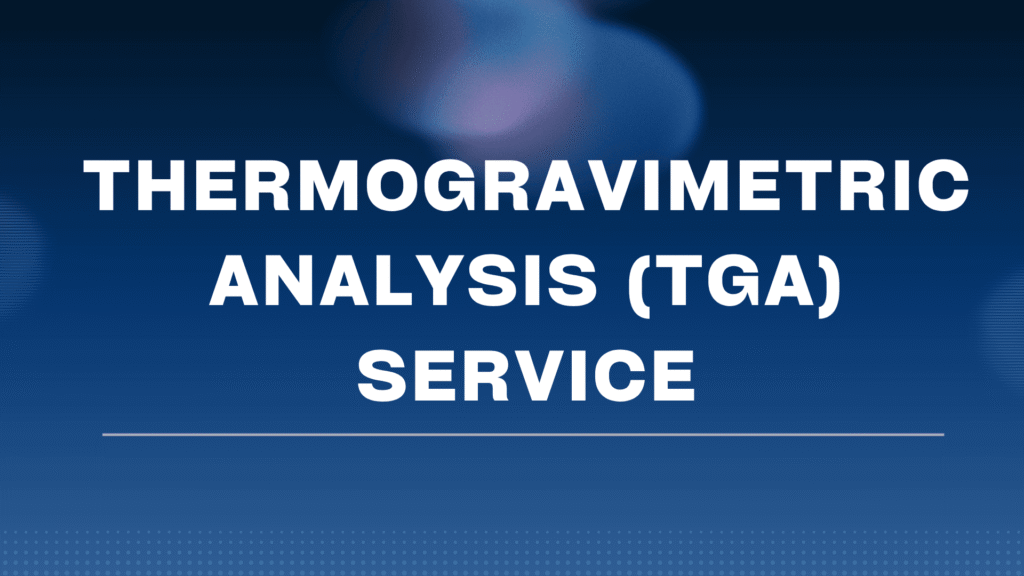.
.
.
Thermogravimetric Analysis (TGA) Service

At ResolveMass Laboratories Inc., our Thermogravimetric Analysis (TGA) Service delivers precise data on the thermal stability, composition, and degradation behavior of materials. Using high-precision thermobalances, our experts monitor mass changes as a function of temperature or time, providing critical insights for polymers, composites, pharmaceuticals, and advanced materials. Each test is performed under rigorously controlled atmospheric conditions to ensure reliable, reproducible, and traceable results.
What Is Thermogravimetric Analysis (TGA)?
Thermogravimetric Analysis (TGA) is a thermal characterization technique that measures the change in a material’s mass as it is heated, cooled, or held isothermally. It helps determine properties such as thermal stability, composition, oxidative resistance, and decomposition kinetics. At ResolveMass Laboratories, we employ advanced TGA systems capable of operating under various atmospheres (nitrogen, air, or inert gas) and temperature ranges exceeding 1000°C.
For related analytical methods, explore:
- Thermal Stability Analysis
- Moisture Content Determination
- Material Decomposition and Residue Testing
Our TGA Capabilities
Parameters Measured by TGA:
- Weight loss and thermal stability
- Decomposition and oxidation temperatures
- Moisture and volatile content
- Filler and residue quantification
- Thermal degradation kinetics
- Material composition and purity estimation
Our laboratory’s expertise ensures that each analysis is tailored to your material type and project objective. Whether you are validating polymer formulations, studying pharmaceutical stability, or assessing inorganic filler content, our scientists deliver accurate data supported by clear, well-documented reports.
Why Choose ResolveMass Laboratories Inc.?
With deep experience in thermal analysis, ResolveMass Laboratories Inc. stands as a trusted partner for industrial and academic clients. Our commitment to analytical precision, data transparency, and method validation ensures that every result meets both research and regulatory expectations. Clients benefit from personalized technical support and quick turnaround times without compromising data quality.
Applications of Thermogravimetric Analysis (TGA)
- Evaluation of polymer degradation and additives
- Determination of residual solvents and volatiles
- Oxidation and combustion studies
- Quality control for pharmaceutical formulations
- Research on inorganic and hybrid materials
- Characterization of fillers, ash, and metal oxides
Request a TGA Analysis or Consultation
Our team of analytical scientists is ready to assist you with comprehensive Thermogravimetric Analysis (TGA) testing. From single-sample studies to method development, we provide actionable data to support your research, manufacturing, or quality control processes.
Request TGA Analysis → https://resolvemass.ca/contact/
Frequently Asked Questions (FAQs)
Thermogravimetric Analysis (TGA) measures the change in a material’s mass as it is heated or cooled under controlled conditions. It helps identify processes such as decomposition, oxidation, and evaporation. The results reveal vital information about a material’s thermal stability, composition, and overall behavior when exposed to heat.
TGA focuses on changes in mass, while Differential Scanning Calorimetry (DSC) measures changes in energy or heat flow. TGA determines when a material loses weight due to thermal events, and DSC identifies when those events absorb or release heat. Together, they give a complete understanding of a material’s thermal properties.
TGA can be performed on a wide range of materials including polymers, pharmaceuticals, composites, ceramics, food samples, and inorganic compounds. Any substance that exhibits weight changes with temperature can be tested, making TGA useful across multiple industries such as manufacturing, research, and material development.
Only a small quantity—typically between 5 and 20 milligrams—is needed for accurate Thermogravimetric Analysis. This allows for precise temperature control and rapid thermal response. The small sample size also ensures consistent heating and reliable data even for highly reactive or delicate materials.
TGA can be conducted under nitrogen, air, oxygen, or custom gas atmospheres depending on the study objective. Each environment helps simulate different conditions—oxidative testing for stability studies or inert atmospheres to prevent unwanted reactions during thermal decomposition.
Yes. TGA is a powerful tool for determining material composition, filler content, and purity levels. By studying weight loss patterns, scientists can quantify the proportion of organic and inorganic components. This information is particularly valuable in polymer formulation and pharmaceutical quality control.
Conclusion
The Thermogravimetric Analysis (TGA) Service at ResolveMass Laboratories Inc. provides scientifically validated, high-precision results for assessing material stability and composition. Our experienced analysts, advanced instrumentation, and rigorous quality control guarantee dependable data that supports your product innovation, research, and compliance.
Contact Us Today → https://resolvemass.ca/contact/
References
- Tang, L. (2022). Thermogravimetric analysis of the combustion characteristics of coals subjected to different chemical demineralization processes. ACS Omega, 7(13), 11650–11658. https://doi.org/10.1021/acsomega.2c00522
- Walker, T. (2024). Unveiling the secrets of thermogravimetric analysis: A comprehensive exploration. Advanced Materials Science Research, 7(6), 235–236. https://doi.org/10.37532/aaasmr.2024.7(6).235-236
- Coats, A. W., & Redfern, J. P. (1963). Thermogravimetric analysis. Analyst, 88(1053), 906–924. https://doi.org/10.1039/AN9638800906